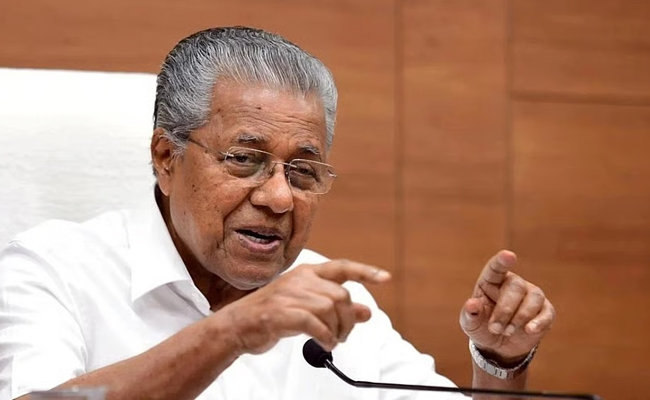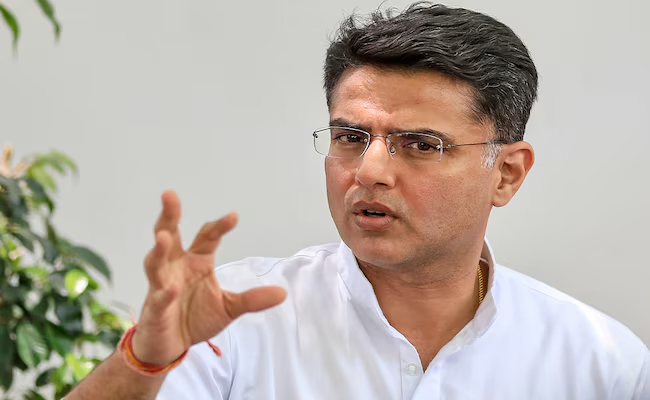Khan Younis (Gaza Strip) (AP): A massive blast rocked a Gaza City hospital packed with wounded and other Palestinians seeking shelter Tuesday, killing hundreds of people, the Hamas-run Health Ministry said. Hamas blamed an Israeli airstrike, while the Israeli military blamed a rocket misfired by other Palestinian groups.
At least 500 people were killed, the ministry said.
As rage spread through the region because of the hospital carnage, and with US President Joe Biden heading to the Mideast in hopes of stopping the war from spreading, Jordan's foreign minister said his country canceled a regional summit scheduled for Wednesday in Amman, where Biden was to meet with Jordan's King Abdullah II, Palestinian President Mahmoud Abbas and Egyptian President Abdel Fattah el-Sissi.
The war between Israel and Hamas was "pushing the region to the brink," Foreign Minister Ayman Safadi told state-run television. He said Jordan would host the summit only when everyone had agreed its purpose would be to "stop the war, respect the humanity of the Palestinians and deliver the aid they deserve."
Biden will now visit only Israel, a White House official said.
The explosion at the al-Ahli Hospital left gruesome scenes. Video that The Associated Press confirmed was from the hospital showed fire engulfing the building and the hospital grounds strewn with torn bodies, many of them young children. The grass around them was strewn with blankets, school backpacks and other belongings.
The bloodshed unfolded as the US tried to convince Israel to allow the delivery of supplies to desperate civilians, aid groups and hospitals in the tiny Gaza Strip, which has been under a complete siege since Hamas' attack in southern Israel last week. Hundreds of thousands of increasingly desperate people were searching for bread and water.
Hamas called Tuesday's hospital blast "a horrific massacre," saying it was caused by an Israeli strike.
The Israeli military blamed Islamic Jihad, a smaller, more radical Palestinian group that often works with Hamas. The military said Islamic Jihad had fired a barrage of rockets near the hospital and that "intelligence from multiple sources" indicated the group was responsible.
In a briefing with reporters, the chief army spokesman, Rear Adm. Daniel Hagari, said the army determined there were no air force, ground or naval attacks in the area at the time of the blast. He said radar detected outgoing rocket fire at the same moment, and intercepted communications between the groups indicated that Islamic Jihad fired the rockets.
Hagari also shared aerial footage collected by a military drone that showed a blast that he said was inconsistent with Israeli weaponry. He said the explosion occurred in the building's parking lot.
Since the war began, the military said in a statement that roughly 450 rockets fired at Israel by the groups had landed in Gaza, "endangering and harming the lives of Gazan residents."
Islamic Jihad dismissed those claims, accusing Israel of "trying hard to evade responsibility for the brutal massacre it committed."
The group pointed to Israel's order that Al-Ahli be evacuated and its previous bombing of the hospital complex as proof that the hospital was an Israeli target. It also said the scale of the explosion, the angle of the bomb's fall and the extent of the destruction all pointed to Israel.
Hundreds of Palestinians had taken refuge in Al-Ahli and other hospitals in Gaza City in past days, hoping they would be spared bombardment after Israel ordered all residents of the city and surrounding areas to evacuate to the southern Gaza Strip.
Ambulances and private cars rushed some 350 casualties from the al-Ahli blast to Gaza City's main hospital, al-Shifa, which was already overwhelmed with wounded from other strikes, said its director, Mohammed Abu Selmia. The wounded were laid onto bloody floors, screaming in pain.
"We need equipment, we need medicine, we need beds, we need anesthesia, we need everything," Abu Selmia said. He warned that fuel for the hospital's generators would run out within hours.
Before the Al-Alhi Hospital deaths, Israeli strikes on Gaza killed at least 2,778 people and wounded 9,700, according to the Gaza Health Ministry. Nearly two-thirds of those killed were children, a ministry official said. Another 1,200 people across Gaza are believed to be buried under the rubble, alive or dead, health authorities said.
Hamas' October 7, attack in southern Israel killed more than 1,400 people, mostly civilians, and resulted in some 200 being taken captive into Gaza. Hamas in Gaza have launched rockets every day since, aiming at cities across Israel.
Hundreds of Palestinians flooded the streets of major West Bank cities including Ramallah, the seat of the Palestinian Authority, where protesters hurled stones at Palestinian security forces who fired back with stun grenades. Others threw stones at Israeli checkpoints, where soldiers killed one Palestinian, West Bank authorities said.
Elsewhere, hundreds of people joined protests that erupted in Beirut and Amman, where an angry crowd gathered outside the Israeli Embassy.
Abbas, whose Palestinian Authority exercises limited autonomy in parts of the occupied West Bank, had cancelled his participation in the summit earlier in the day to protest the hospital blast.
He blamed Israel for the destruction, calling it "a massacre that cannot be tolerated or allowed to pass without accountability."
With tens of thousands of troops massed along the border, Israel has been expected to launch a ground invasion into Gaza, but its plans remained uncertain.
"We are preparing for the next stages of war," military spokesman Lt. Col. Richard Hecht said. "We haven't said what they will be. Everybody's talking about a ground offensive. It might be something different."
Throughout the day Tuesday, airstrikes killed dozens of civilians and at least one senior Hamas figure in the southern half of the Gaza Strip, where the Israeli military told fleeing Palestinians to go. An Associated Press reporter saw around 50 bodies brought to Nasser Hospital after strikes in the southern city of Khan Younis.
The Israeli military said it was targeting Hamas hideouts, infrastructure and command centres.
An airstrike in Deir al Balah reduced a house to rubble, killing a man and 11 women and children inside and in a neighboring house, some of whom had evacuated from Gaza City. Witnesses said there was no warning before the strike.
Shelling from Israeli tanks hit a UN school in central Gaza where 4,000 Palestinians had taken refuge, killing six people and wounding dozens, the United Nations Palestinian refugee agency said. At least 24 U.N. installations have been hit the past week, killing at least 14 members of the agency's staff.
A barrage of strikes crashed into the Bureij refugee camp in central Gaza, levelling an entire block of homes and causing dozens of casualties, residents said. Among those killed was one of Hamas' top military commanders, Ayman Nofal, the group's military wing said the highest-profile individual known to have been killed in the war.
In Gaza City, Israeli airstrikes also hit the house of Hamas' top political official, Ismail Haniyeh, killing at least 14 people. Haniyeh is based in Doha, Qatar, but his family lives in Gaza City. The Hamas media office did not immediately identify those killed.
Israeli Prime Minister Benjamin Netanyahu sought to put the blame on Hamas for Israel's retaliatory attacks and the rising civilian casualties in Gaza. "Not only is it targeting and murdering civilians with unprecedented savagery, it's hiding behind civilians," he said.
With Israel barring entry of most water, fuel and food into Gaza since Hamas' brutal attack, US Secretary of State Antony Blinken secured an agreement with Netanyahu to discuss creation of a mechanism for delivering aid to the territory's 2.3 million people. US officials said the gain might appear modest, but stressed that it was a significant step forward.
Still, as of late Tuesday, there was no deal in place. A top Israeli official said his country was demanding guarantees that Hamas would not seize any aid deliveries. Tzahi Hanegbi, head of Israel's National Security Council, suggested entry of aid also depended on the return of hostages held by Hamas.
More than 1 million Palestinians have fled their homes roughly half of Gaza's population and 60 per cent are now in the approximately 14-kilometre (8-mile) long area south of the evacuation zone, the UN said.
At the Rafah crossing, Gaza's only connection to Egypt, truckloads of aid had been waiting to enter for more than a day. The World Food Program said that it had more than 300 tons of food waiting to cross into Gaza.
Let the Truth be known. If you read VB and like VB, please be a VB Supporter and Help us deliver the Truth to one and all.
Thiruvananthapuram (PTI): The Kerala government on Monday assured stringent action in the mob lynching of a Chattisgarh native mistaken to be a thief, and promised justice to the family, even as the ruling CPI(M) targeted the RSS over the assault, a charge denied by the BJP.
Ramnarayan (31), was allegedly beaten to death on Wednesday after being accused of involvement in theft at Kizhakeattappallam near Walayar in Palakkad district.
With the issue sending shock waves across the state, Chief Minister Pinarayi Vijayan on Monday described the incident as "deeply disturbing".
Assuring justice to his family, who have arrived in the state, Vijayan said such acts tarnish the reputation of a progressive society like Kerala and are completely unacceptable.
State minister M B Rajesh claimed racial slurs were made at the victim and that the attackers were RSS workers. Ruling CPI (M) state secretary M V Govindan also alleged that RSS-BJP workers were behind the crime.
ALSO READ: After Hadi, another Bangladesh student leader shot in head
In a statement issued by the CM's office, Vijayan said strict action would be taken against those responsible for the crime.
A special investigation team of the district police is probing the incident, he said, adding that instructions have been issued to thoroughly examine the details of the case and initiate all necessary legal proceedings.
The government will also review the matter and ensure appropriate compensation to the victim's family, Vijayan added.
He called for collective vigilance to prevent the recurrence of such incidents in the future.
His remarks came a day after opposition Congress and the victim's family demanded compensation and an investigation under stringent laws, including the SC/ST (Prevention of Atrocities) Act.
The brother of deceased man told reporters on Sunday that the family would not accept the body until their demands, including compensation of Rs 25 lakh, are met.
Kerala ministers K Rajan and Rajesh strongly condemned the incident and said it was not just a mob lynching case but racial abuse was involved in it.
The ministers said the accused had attacked the deceased man, calling him a "Bangladeshi" and beat him to death.
"The government will ensure a foolproof probe into the incident, and no one involved in the crime will be spared," Revenue Minister Rajan told reporters in Thrissur.
He said an amount not less than Rs 10 lakh would be granted from the Chief Minister's Distress Relief Fund (CMDRF) to the deceased man's family and a cabinet meeting would take a decision in this regard.
LSGD Minister Rajesh also said Ramnarayan was branded as a Bangladeshi by the attackers.
While talking to reporters in Palakkad, he alleged that those who brutally assaulted and killed Ramnarayan were RSS workers.
The Chhattisgarh native, who reached Kerala in search of a job, became a victim of the "divisive politics" of Sangh Parivar, Rajesh further alleged.
"Branding a person as Bangladeshi came from racial politics. Ramnarayan was a victim of the racial poison spread by the Sangh Parivar in the country," he charged.
Rajesh also accused a section of the media of hiding the involvement of the RSS in the assault.
Stepping up the attack against the right-wing groups, CPI (M) state secretary M V Govindan alleged that RSS-BJP workers were the ones behind the crime.
"Those involved in the incident were accused in various criminal cases of RSS. All of them were identified. Such cruelties should not be allowed to repeat in the state," he said.
Expressing strong protest, the senior leader further said a society which believes in democratic values and secular principles cannot accept such crimes.
Senior BJP leader Kummanam Rajasekharan strongly rejected the charges against the saffron party and the RSS.
"Actually, why is politics mixed in such crimes. When a heinous crime like mob lynching happens, should it not be treated as an anti-social act," he told reporters here.
Leader of Opposition in the state Assembly, V D Satheesan urged the government to take urgent steps to provide financial assistance to the family of Ramnarayan.
Meanwhile, Palakkad Superintendent of Police Ajit Kumar said at present, the case was registered under sections of murder, and after a detailed probe, more would be added.
After verifying the caste certificate of the deceased man, SC/ST (Prevention of Atrocities) Act would also be invoked, he told reporters in Palakkad.
A 10-member Special Investigation Team (SIT) has been formed under the DSP (district crime branch) to probe the mob lynching incident. The SIT will be under the direction and supervision of the Pakakkad SP, he added.
ALSO READ: 17-year-old PUC student in Shivamogga drowns while swimming in River Tunga
When reporters asked about the political background of the accused persons, the officer said it was being verified.
He said that the arrested persons were already facing police cases.
Five people have been arrested so far for allegedly beating Ramnarayan to death on suspicion of theft.
The injured man was rushed to the Palakkad District Government Hospital, where he later succumbed to his injuries.





